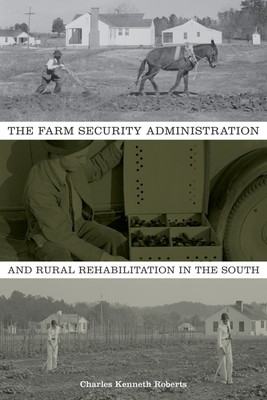
- We will send in 10–14 business days.
- Author: Charles Kenneth Roberts
- Publisher: Univ Tennessee Press
- ISBN-10: 1621901602
- ISBN-13: 9781621901600
- Format: 16 x 23.6 x 2.8 cm, hardcover
- Language: English
- SAVE -10% with code: EXTRA
The Farm Security Administration and Rural Rehabilitation in the South (e-book) (used book) | bookbook.eu
Reviews
Description
As the roaring twenties turned into the depressed thirties, southern farmers, far removed from the
urban prosperity Americans had enjoyed during the 1920s heyday, found already difficult farming
conditions greatly intensified by the onset of the Great Depression. Agricultural incompetence
plagued the rural South through the misuse of land, depletion of natural resources, and a system
of single-crop farming that failed to adequately provide for growing families on small farms, especially
in the cotton-producing Southeast. Poverty and desperation came to define the farming
communities of the rural South, both in reality and in Americans' collective conscious.
In The Farm Security Administration and Rural Rehabilitation in the South, Charles Kenneth
Roberts traces the administrative and political history of the Farm Security Administration
(FSA) and reconciles the administration's goals with Franklin D. Roosevelt's overall vision for the
New Deal. Roberts takes a grassroots approach to dissecting the FSA's history. While other studies
have focused on FSA photography or community building, or even policy making in terms of
top-down government directives, Roberts focuses on the people and state governments who faced
an immediate need to aid southern farmers within their own borders and to boost their states'
crumbling agricultural economic bases. Roberts focuses on rural rehabilitation as a key aspect of
the FSA and defines the agency's legacy not in terms of its failures but rather in terms of an idealistic
program whose modest successes were ultimately too few to effect real change for southern
farmers.
infighting hindered many of the administration's goals, the creation of the FSA stands as one of
the first efforts to provide sustained relief to struggling southern farmers. In light of other federal
programs of the era, the FSA may seem like a mere footnote to the New Deal outside of its small
but revered photography program. But, as Roberts shows, the FSA's legacy has endured to the
present day.
EXTRA 10 % discount with code: EXTRA
The promotion ends in 19d.22:10:56
The discount code is valid when purchasing from 10 €. Discounts do not stack.
- Author: Charles Kenneth Roberts
- Publisher: Univ Tennessee Press
- ISBN-10: 1621901602
- ISBN-13: 9781621901600
- Format: 16 x 23.6 x 2.8 cm, hardcover
- Language: English English
As the roaring twenties turned into the depressed thirties, southern farmers, far removed from the
urban prosperity Americans had enjoyed during the 1920s heyday, found already difficult farming
conditions greatly intensified by the onset of the Great Depression. Agricultural incompetence
plagued the rural South through the misuse of land, depletion of natural resources, and a system
of single-crop farming that failed to adequately provide for growing families on small farms, especially
in the cotton-producing Southeast. Poverty and desperation came to define the farming
communities of the rural South, both in reality and in Americans' collective conscious.
In The Farm Security Administration and Rural Rehabilitation in the South, Charles Kenneth
Roberts traces the administrative and political history of the Farm Security Administration
(FSA) and reconciles the administration's goals with Franklin D. Roosevelt's overall vision for the
New Deal. Roberts takes a grassroots approach to dissecting the FSA's history. While other studies
have focused on FSA photography or community building, or even policy making in terms of
top-down government directives, Roberts focuses on the people and state governments who faced
an immediate need to aid southern farmers within their own borders and to boost their states'
crumbling agricultural economic bases. Roberts focuses on rural rehabilitation as a key aspect of
the FSA and defines the agency's legacy not in terms of its failures but rather in terms of an idealistic
program whose modest successes were ultimately too few to effect real change for southern
farmers.
infighting hindered many of the administration's goals, the creation of the FSA stands as one of
the first efforts to provide sustained relief to struggling southern farmers. In light of other federal
programs of the era, the FSA may seem like a mere footnote to the New Deal outside of its small
but revered photography program. But, as Roberts shows, the FSA's legacy has endured to the
present day.


Reviews